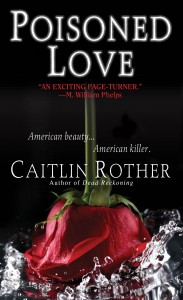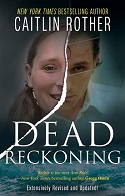 Synopsis:
Synopsis:
Kristin Rossum was an extremely intelligent, beautiful girl from an accomplished family for whom the future held literally endless possibilities. Today she is an inmate at the California Correctional Women’s Facility (CCWF) in Chowchilla, California, where she is serving a life sentence without the possibility of parole after being convicted of murdering her husband, Greg de Villers. Her story is the subject of Poisoned Love by bestselling author Caitlin Rother.
Kristin was passionate about roses — her favorite movie was American Beauty. As a high school student, she began using drugs and was soon addicted to crystal methamphetamine. Rather than provide her with the treatment she clearly needed, her parents opted to send her away to college for a fresh start. And for a time, Kristin seemed to pull herself together. But eventually, she began using again and when she suddenly disappeared, rather than confess that she was flunking all of her courses, her parents were frantic. Kristin ran away to Mexico where she encountered Greg de Villers on a getaway with his two brothers, Bertrand and Jerome. Immediately drawn to each other, Greg seemed to be the savior Kristin so desperately needed. She began living with him and once again got clean. She returned to school, graduated summa cum laude with a degree in chemistry, and embarked on a promising career with the San Diego County Medical Examiner as a toxicologist. Despite the misgivings that she enunciated to her parents, Kristin and Greg were married.
Unfortunately, Kristin was also passionate about her supervisor, Michael Robertson, and the two began a torrid affair. Kristin’s job gave her ready access to a variety of legal and illegal drugs, especially considering the laboratory’s lack of security protocols. As one newspaper observed, it was a veritable “candy store” for an addict like Kristin.
When Greg died suddenly, Kristin’s behavior created suspicion. Kristin posited that Greg, who disavowed even benign over the counter drugs, took his own life after learning that Kristin planned to leave him by taking an overdose of old prescription medications that she thought she had disposed of, along with cough syrup. Kristin’s story about finding Greg in bed unconscious and pulling back the blankets to find his chest covered with red rose petals — their wedding photo tucked under his pillow — sounded more like a murder staged to appear to be a suicide, especially after the details of her relationship with Michael, who was at her side in the emergency room that night, began emerging. “[Greg] had given me a dozen beautiful long-stem roses for my birthday. I think he was just making a statement that he knew our relationship was over,” she insisted, but the jury did not believe her, instead accepting the prosecution’s version of events: Kristin poisoned Greg with fentanyl in order to prevent him from exposing her drug addiction and affair with Robertson which would have derailed both her career and the life together she and Robertson were planning.
Review:

Employing the painstaking research and impeccable attention to detail for which she is known, author Caitlin Rother relays the real-life cautionary story of Kristin Rossum and the “American Beauty murder” of her husband, Greg de Villers, just a few days before his twenty-seventh birthday.
The story has all the makings of a great mystery: Illicit, passionate sex and desire; jealousy and resentment; a codependent relationship; easy access to drugs; and at the center of it all, a narcissistic addict enabled by her naive, appearance-conscious parents. The result is a taut, fascinating tale. Rother details Kristin and Greg’s childhoods, as well as how they met and instantly fell into a relationship. Greg was an average student and quiet young man who was close to his two brothers. The three boys survived a tumultuous childhood wracked by their parents’ prolonged, bitter divorce that eventually resulted in Greg’s estrangement from his physician father. Although Kristin came from an intact home and her parents were both professionals holding advanced degrees, they did not address her drug use effectively upon learning of it. The result? A “perfect storm” was set in motion when Greg happened upon a strung-out Kristin and determined to rescue her.
Rother explains how Kristin’s addiction fueled her behavior and the undisputed facts indict the employers who failed to recognize her problem either through appropriate background screenings or personal observations by professionals who, based upon their training and expertise, should have recognized the signs. Ironically, Kristin was placed in a position of responsibility for logging and accounting for drugs recovered from crime and accident scenes, and worked under the direct supervision of an expert on some of the most effective yet potentially lethal painkillers available. As a toxicologist, Kristin knew the procedures employed during autopsies, as well as what drugs were the subject of routine screenings. Fentanyl was not among them. Further, when she became romantically entangled with her boss, their superiors failed to take appropriate action to preserve the integrity of the workplace, thus unwittingly compounding the factors that would eventually allow Kristin to take Greg’s life.
Rother takes great pains to present the story in a matter-of-fact, nonjudgmental manner, as she chronicles the observations and strategies of medical and law enforcement personnel, as well as both the prosecutors who eventually secured Kristin’s conviction and her team of defense attorneys. She presents the trial highlights, as well as aspects of Kristin’s numerous appeals, in a straight-forward, understandable style. Rother’s restrained technique serves to underscore and heighten the tragic import of Kristin’s drug-addled, self-involved agenda, while inspiring more questions than answers about who Greg de Villers really was. His family portrayed him very differently than did Kristin and her parents, leaving readers to draw their own conclusions about the young man whose life ended far too soon. The jury convicted Kristin. Readers may or may not, depending upon their own interpretation of the evidence so skillfully and even-handedly presented by Rother.
Poisoned Love, originally published in 2006, is Rother’s first book. It has been re-released with updates about the status of Kristin’s various appeals, as well as the lives and careers of the principals involved in the case. It is a compelling read, powerful in its truth as expertly unveiled by Rother. Rother reveals her personal reasons for penning the book: she was married to an alcoholic who took his own life in 1999 a few days after she told him the relationship was over. Like Kristin, he was a San Diego County employee who managed to hide his addiction from both his future wife and his coworkers for quite some time. But eventually the disease resulted in depression, shame, lost jobs, and failed marriages. About Poisoned Love, Rother observes: “Yes, this book is a sexy story about a fatal love triangle, illicit drugs, adultery, addiction and murder. But I hope people will also see it as a cautionary tale about how drugs can destroy not just one life, but many others in the process.”















1 Comment
Hope you had a wonderful birthday, Christmas holiday and upcoming New Year.